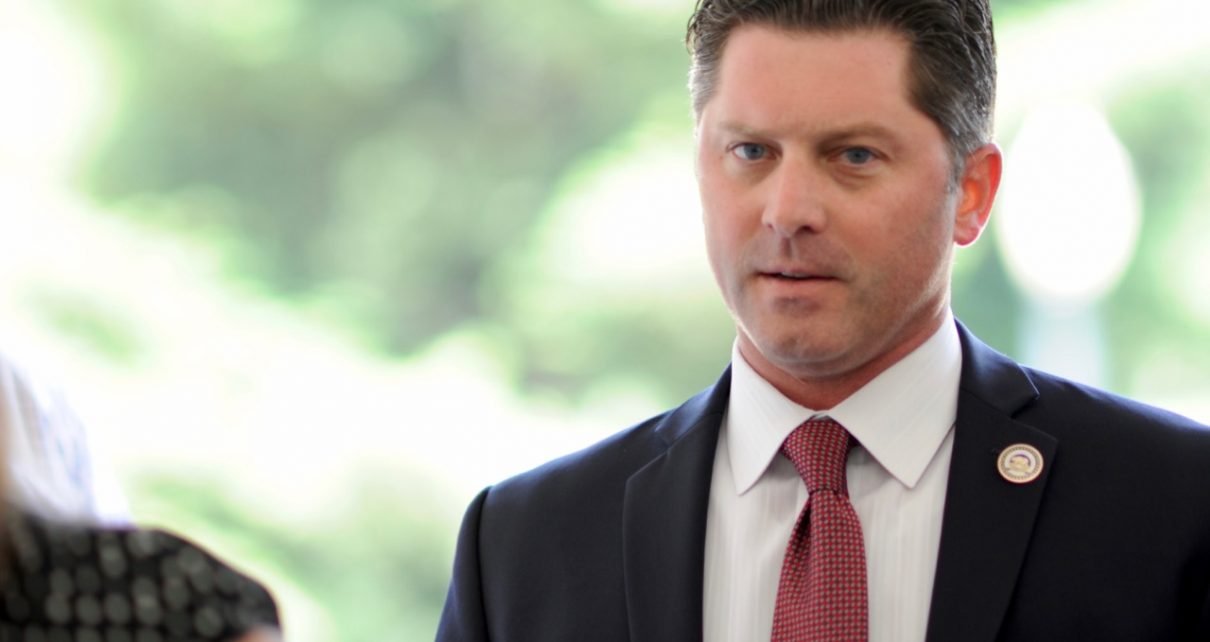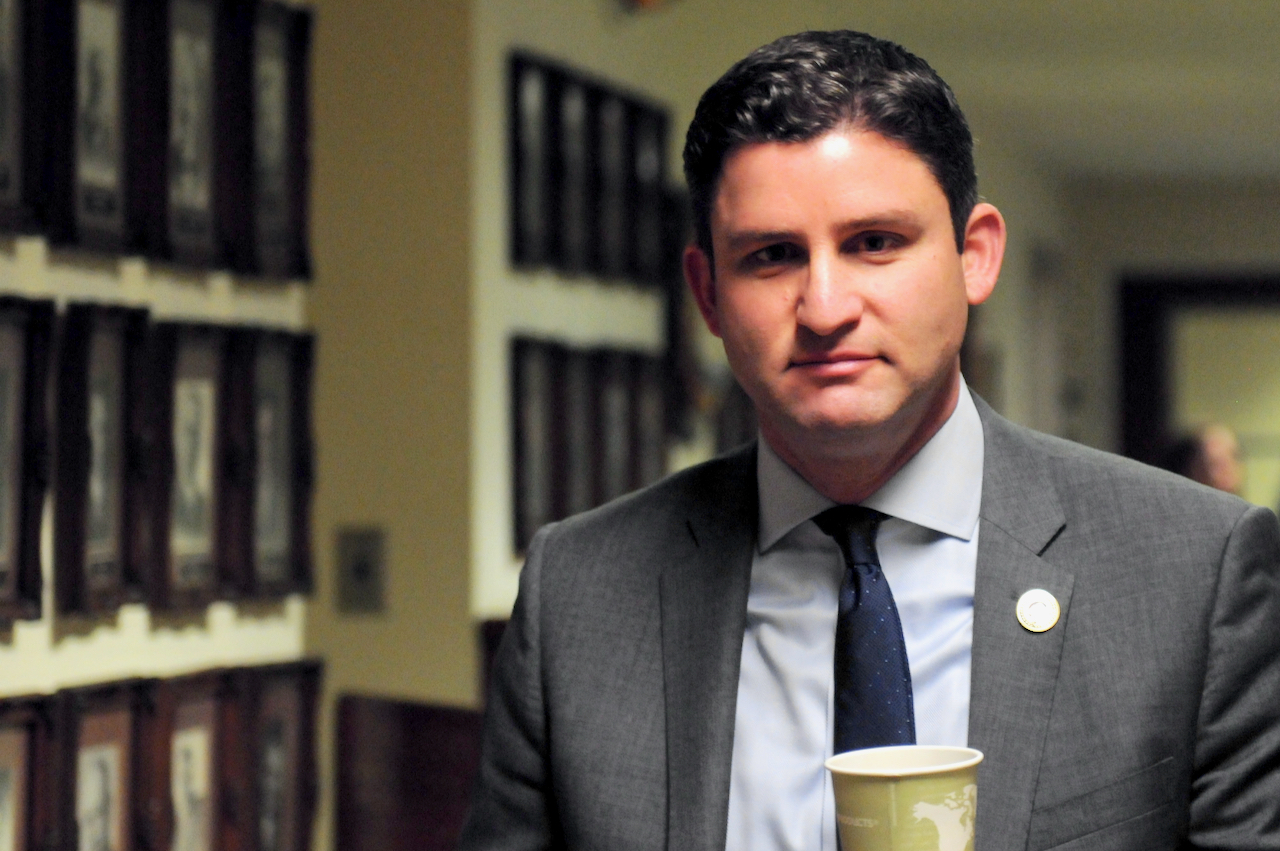
Assemblyman Jordan Cunningham. (Kevin Sanders for California Globe)
Bill To Punish Social Media Companies For Addictive Features For Minor Users Passes Assembly
AB 2408 has strong support from Democrats, Republicans
By Evan Symon, May 24, 2022 2:15 am
A bipartisan bill that would punish social media companies for having addictive and harmful features for users under the age of 18 was passed by the Assembly on Monday, moving on to the Senate.

Assembly Bill 2408, authored by Assemblyman Jordan Cunningham (R-Paso Robles) and Assemblywoman Buffy Wicks (D-Oakland), would hold social media companies responsible for addicting children under the age of 18 to their services and would impose a duty not to addict as well as prohibit the use and sale of a child’s personal data. The bill, also known as the Social Media Platform Duty to Children Act, would allow the legal guardian of the child who suffers injury due to the addiction to sue the companies, which includes a civil penalty of $25,000 per violation.
AB 2408 would cover all social media features created before January 2023. Only social media companies that make $100 million or more in gross revenue in the past year would be covered by the bill. Streaming services such as Netflix, Hulu, or Disney+ would not be covered, with the same exemption ruling out companies that only offer e-mailing or texting services, due to their everyday and emergency uses.
If passed, companies would either have until April of next year to remove the features addictive to those under 18 or conduct regular audits to find any parts of their service being addictive and taking action to not be held liable.
Both Assembly members wrote the bill due to studies showing the rise of social media addiction in teens, recent social media company whistleblowers coming forward with information showing how addictive it can be, and growing concern among parental and advocacy groups that social media is growing less safe for kids.
“The era of unfettered social experimentation on children is over and we will protect kids,” said Assemblyman Cunningham on Monday. “The issue that we’re trying to address is there’s really no incentive for these social media companies to do anything different than what they’ve been doing. D.C. isn’t taking action on this. There’s bipartisan agreement that something needs to happen. But guess what’s coming out of Washington? Nothing. California can lead the way here.”
In a tweet this weekend, Cunningham also pointed out the high amount of support the bill has from voters, saying that “82 percent of California voters think that Big Tech and lawmakers should do more to protect kids online. You can’t get 82 percent of voters to agree that the Sun rises in the East these days. Think about that.”
82 percent of CAlifornia voters think that Big Tech and lawmakers should do more to protect kids online. You can’t get 82 percent of voters to agree that the Sun rises in the East these days. Think about that. https://t.co/yHzJlDF6wu
— Jordan Cunningham (@Cunning_Jordan) May 20, 2022
Support for, opposition against AB 2408
However, many business groups and tech companies have come out in opposition to the bill, warning that many may leave California rather than make large, possibly damaging changes to comply with the new law, as well as the bill depriving many under 18 to communicate with the world and possibly forcing them to go to other, even less regulated social media sites.
“We share your goal of protecting kids online. Yet we worry this bill would expose kids to a more unsafe environment and reduce kids’ ability to communicate, share and connect with each other and the broader world,” explained Chamber of Progress director of state and local policy Tyler Smith last week during a committee hearing. “The bill would drive kids away from the very services that have invested the most resources in protecting their young users.”
Still others took a more nuanced view.
“This isn’t so much regulation as it is putting in common sense measures that allow the social media company to keep doing its thing but would also put in guardrails in certain areas to clamp down on the problems for minors,” said Leah Fletcher, a legal examiner who has helped advise on age-restriction laws in the past, to the Globe on Monday. “Voting, drinking, tobacco, marijuana – all of these have have an age cutoff. Online it is harder, but there is still age verification measures on many parts of it, like getting access to pornography, viewing violent or other adult content, and lots of other parts.”
“The bill would sort of be a combination. This is something addictive we need to put an age limit on, but because it is on the internet, we need to play by the limiting rules there. Questions will arise, like if a kid lies about their age. Are they liable then because they led, or is the social media company liable because they didn’t verify properly? We have some answers now, but will they carry over here?”
“Point is is that it’s a problem and something is being done. Kind of a drag for the companies because they need to put in the guardrails which is a hassle, but they have time too.”
The bipartisan nature of the bill has made it an easier sell to more cautious Democrats and Republicans, resulting in few coming out against it, and in the Judiciary hearing last week, it passing unanimously.
AB 2408 will next be heard in Senate Committees in the coming weeks.
- Bill to Require Law Enforcement Disclosure if AI Was Used To Help Write Reports - August 7, 2025
- Gov. Newsom Files FOIA Request To ‘Expose True Cost’ Of L.A. Federal Troop Deployment for Anti-ICE Riots - August 6, 2025
- California Redistricting: How Newsom’s Plan Will Demolish Hard Fought GOP Gains - August 6, 2025





90 thoughts on “Bill To Punish Social Media Companies For Addictive Features For Minor Users Passes Assembly”